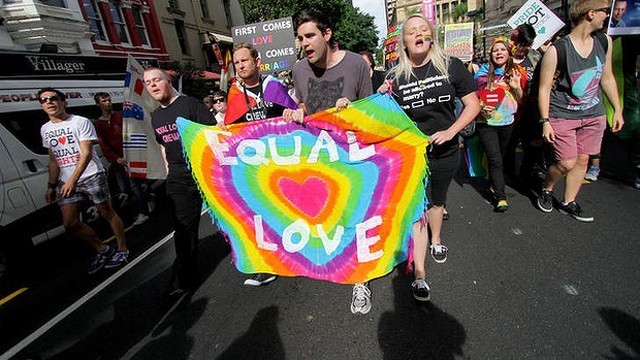I’ve always been bemused by some people’s violent reaction to same-sex marriage. Why on earth should I care how consenting adults conduct their relationships? After all, it’s not like anyone’s forcing me to marry gay.
But violent reactions there are, and nothing brings them to the fore like a renewed push for marriage equality.
Last week, the ACT passed laws legalising same-sex marriage within the ”rainbow territory”, prompting tears, applause and a spontaneous rendition of Love is in the Air in the legislative assembly.
It brought to mind the moving scenes in New Zealand’s Parliament in April when, after same-sex marriage rights were legislated, members of the public gallery burst into song, filling the chamber with the spine-tingling sounds of the century-old Maori love song Pokarekare Ana.
A month later Britain followed suit, despite David Cameron facing a revolt from within his own party. Cameron had famously declared: ”Conservatives believe in the ties that bind us; that society is stronger when we make vows to each other and support each other. So I don’t support gay marriage despite being a Conservative. I support gay marriage because I’m a Conservative.”
In contrast, our Prime Minister appears to be imposing the government’s will on the choices of individual citizens.
On Friday, the High Court held its first hearing into the ACT laws, which the federal government argues are incompatible with the Marriage Act and the Family Law Act (remember, the Howard Government amended the Marriage Act in 2004 to stipulate that marriage in Australia is between a man and a woman).
It will test the ACT’s claim that the territory laws can work independently of the federal laws, so anyone not covered by the federal act – that is, same-sex couples – can marry in the ACT.
The cleverness of the government’s handball to the High Court is that it performs two functions.
First, if it wins, it will kill any ambitions by other states and territories to introduce similar legislation.
Second, it avoids a messy and emotional debate about the value of love on the floor of Parliament.
But if the government does lose its High Court battle and decides to legislate the ACT laws away, it has two options.
It can either resort to its power to knock off laws introduced in the ACT and Northern Territory with the support of both houses of Parliament, or it could try to retrospectively amend the Marriage Act.
Constitutional law expert Professor George Williams argues the second option is a minefield, given the constitutional power of the Commonwealth to make marriage laws affecting the states has never been properly resolved.
Nor would a conscience vote guarantee the outcome sought by marriage equality activists.
Last September, Labor MP Stephen Jones’s private member’s bill to legalise same-sex marriage was lost 98 votes to 42.
While Coalition MPs were bound to unanimously oppose it or risk internal retribution, Labor MPs were granted a rare conscience vote.
They split on the proposal, with 38 MPs including 15 ministers voting for marriage reform, and 26 voting against.
Even if Prime Minister Tony Abbott makes good on his vow to leave a future vote to the party room, clearing the way for a free vote, it’s unlikely more than 30 per cent of Coalition MPs would support another vote.
But all of this is a world away from the world most people live in.
At one wedding I attended recently, the celebrant reminded us – as they are now bound – that ”marriage, according to law in Australia, is the union of a man and a woman to the exclusion of all others”.
He added, at the request of the bride and groom, that it was to be hoped this would soon change to include gay and lesbian people. All the guests broke out into such prolonged applause that proceedings had to be halted.
Now that’s a celebration of love.
Photo: Michelle Smith
Author: Bianca Hall
Publication: Sydney Morning Herald
Date: 27 October 2013

